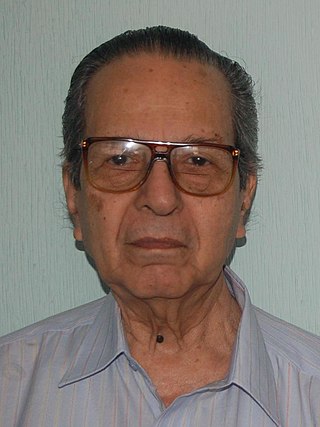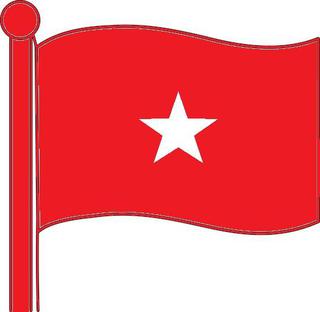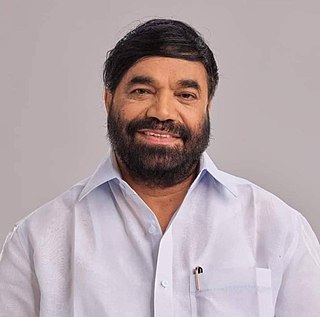Related Research Articles

The Communist Party of India (Marxist) (abbreviated as CPI(M)) is a communist political party in India. It is the largest communist party in India in terms of membership and electoral seats, and one of the national parties of India. The party was founded through a splitting from the Communist Party of India in 1964 and it quickly became the dominant faction.
Trade unions in India are registered and file annual returns under the Trade Union Act (1926). Statistics on trade unions are collected annually by the Labour Bureau of the Ministry of Labour, Government of India. As per the latest data, released for 2012, there were 16,154 trade unions which had a combined membership of 9.18 million. The trade union movement in India is largely divided along political lines and follows a pre-Independence pattern of overlapping interactions between political parties and unions. The net result of this type of system is debated as it has both advantages and disadvantages. According to the data submitted by various trade unions to the Ministry of Labour and Employment as part of a survey, INTUC with a combined membership of 33.3 million, has emerged as the largest trade union in India as of 2013.

Marxist Communist Party of India, MCPI was a political party in India that formed in 1983 under the leadership of Mohan Punamia. It emerged as a splinter group of Communist Party of India (Marxist) stuck to the original 1964 programme. The party general secretary was Jagjit Singh Lyallpuri.

E. Balanandan was an Indian politician and a trade union leader from the Kerala State of India. He had been a member of the Communist Party of India (Marxist)'s politburo since 1978. Born in Sakthikulangara, Kollam district, he was the son of Kunjiraman Channar and Unnikaali Easwari. His wife Sarojini Balanandan was a former CPI(M) State Committee member.

R. Umanath was a communist politician from Tamil Nadu, India, and a Politburo member of Communist Party of India (Marxist) from 1998. He was born in 1921 in Kasaragod, Kerala and moved to Madras during his student days.

Bhalchandra Trimbak Ranadive, popularly known as BTR, was an Indian communist politician and trade union leader.
Basudeb Acharia was an Indian Bengali-Tamil politician and a leader of the Communist Party of India (Marxist) political party. His ancestors were originally from Present-day Tamil Nadu, who settled in Bengal in 16th century. He considered himself to be a Bengali.

Madhukar Kashinath Pandhe was a Politburo member of the Communist Party of India (Marxist) from 2002 to 2011 and was also the General Secretary of the Centre of Indian Trade Unions (CITU), one of the largest trade unions in India.
Communism in India has existed as a social or political ideology as well as a political movement since at least as early as the 1920s. In its early years, communist ideology was harshly suppressed through legal prohibitions and criminal prosecutions. Eventually, communist parties became ensconced in national party politics, sprouting several political offshoots.

Marxist Communist Party of India (United) is a communist party in India, formed in 2005 by the unification of the Marxist Communist Party of India, the Mangat Ram Pasla-led breakaway group from the CPI(M) in Punjab - Communist Party Marxist (Punjab), the BTR-EMS-AKG Janakeeya Vedi (a Kerala-based splinter group of the CPI(M), which had been based in the CITU) and the Hardan Roy group in West Bengal.

The Bolshevik Party of India is an Indian political party in India. The party was founded in 1939. The party had a certain role in the trade union movement in West Bengal and was briefly represented in the state government in 1969. In later years the party has played a negligible role in Indian politics.

J. Hemachandran was an Indian politician and trade unionist. He was a leading personality of the Communist Party of India (Marxist) in the state of Tamil Nadu. He was elected to the Legislative Assembly of Tamil Nadu from the Thiruvattar constituency four times, in 1980, 1984, 1989 and 2001. He served as the leader of the CPI(M) group in the Assembly.

Samar Mukherjee was an Indian Communist leader. who served as member of the Lok Sabha, the lower house of the Parliament of India for the Howrah constituency for three consecutive term, and as a member of the Rajya Sabha. He was a member of the Polit Bureau, member of the Central Committee of Communist Party of India (Marxist) and he was also the General Secretary CITU.

V.N. Vasavan is an Indian politician and the current Minister for Ports and Cooperation and Minister for Devaswoms, Government of Kerala in the second Pinarayi Vijayan Ministry. Now he is also the MLA from Ettumanoor assembly constituency of the Communist Party of India (Marxist) for Kottayam district. Vasavan is the member of the Kerala Legislature for the constituency of Ettumanoor.
Swami Kumaranand, born Dvijendra Kumar Naag, was an Indian politician and leader of Communist Party of India. He was a key builder of the communist movement in Rajputana and Madhya Bharat.
Krishnapada Ghosh (1914–1987) was an Indian politician and trade unionist. He served as West Bengal Minister of Labour 1969–1970 and 1977–1985. He was a Central Committee member of the Communist Party of India (Marxist). He was also a member of the Working Committee of the Centre for Indian Trade Unions.
A. K. Padmanabhan is an Indian Marxist politician and former Politburo member, Communist Party of India (Marxist).
K. Hemalata is an Indian Marxist politician and Central Committee member of Communist Party of India (Marxist). She is the first National level woman leader in the history of trade unions movement in India.
Hari Krishna Vyas was an Indian politician.

In 1964, a major split occurred in the Communist Party of India. The split was the culmination of decades of tensions and factional infighting. When India became independent in 1947, differences arose of how to adapt to the new situation. As relations between the Nehru government and the Soviet Union improved, a faction that sought cooperation with the dominant Indian National Congress emerged within CPI. This tendency was led by S.A. Dange, whose role in the party hierarchy became increasingly controversial. When the Sino-Indian War broke out in 1962 Dange's opponents within CPI were jailed, but when they were released they sought to challenge his leadership. In 1964 the party was finally divided into two, with the left faction forming the Communist Party of India (Marxist). The split had a lot of regional variations. It also impacted other organizations, such as trade union and peasant movements. The split has been studied extensively by scholars, who have sought to analyze the various domestic and international factors involved.
References
- 1 2 Rakhahari Chatterji (1980). Unions, Politics, and the State: A Study of Indian Labour Politics. South Asian Publishers. pp. 60, 162.
- ↑ Institute for Defence Studies and Analyses (1975). The Institute for Defence Studies and Analyses Journal. The Institute. p. 54.
- 1 2 Near East/South Asia Report. Foreign Broadcast Information Service. 1984. p. 147.
- ↑ Link. United India Periodicals. 1977. p. 15.
- ↑ P. P. Bhargava (1995). Trade Union Dynamism. Printwell. p. 67.
- ↑ Democratic World. Gulab Singh & Sons. 1981. p. 13.
- ↑ Trade Union Record. All-India Trade Union Congress. 1987.
- ↑ The Working Class. Centre of Indian Trade Unions. 1989. p. 8.
- ↑ G. L. Gaur (1986). Trade Unionism and Industrial Relations. Deep & Deep Publications. p. 210.
- ↑ B. B. Goswami; Jayanta Sarkar (1997). Ethnicity, Politics, and Political Systems in Tribal India. Anthropological Survey of India, Ministry of Human Resource Development, Department of Culture, Government of India. p. 146. ISBN 978-81-85579-38-2.
- ↑ Asian Recorder. K. K. Thomas at Recorder Press. 1986. p. 19028.
- ↑ Data India. Press Institute of India. 1997. p. 513.